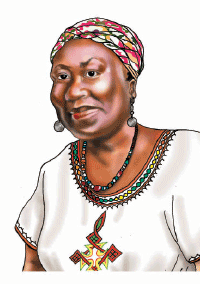Diaspora. Noun. 1. The settling of scattered colonies of Jews outside Palestine after the Babylonian exile; the area outside Palestine settled by Jews; the Jews living outside Palestine or modern Israel. 2. The movement, migration or scattering of a people away from an established or ancestral homeland; people settled far from their ancestral homelands; the place where these people live. (The first definition is of no interest to us in this article, beside that of knowing the origin of the word.)
In the hotel restaurant that morning the lady at the table behind ours decided to come over to say hello because she had overheard me call my grandson and had figured, rightly, that we were Nigerians – that is, my grandson and I. A friend was also with us, our host at the hotel, but her skin colour could not have caused anyone to imagine that she would be an African. The Nigerian lady seemed warm and friendly, apparently pleased to run into some compatriots in a foreign land. She probably was a tad presumptuous or condescending, though, in her assumption that it was my first opportunity to travel out of the country and “escape the madness”. After the initial greetings and introductions, the conversation inevitably turned to Nigeria and its problems – and that was the point at which the interaction went awry.
The lady was the imposing type, and was sure she had figured out exactly what was wrong with the country. She wanted me to realise that although she and her husband had lived in the United States for more than two and three decades respectively, they still had Nigeria very much on their minds. To prove it, they had actually taken all their American-born children home a couple of years ago for the first time, so they could meet their only surviving grandparent and also connect with some other relatives. But the kids hated it, absolutely! (You know how Americans are with superlatives.) Oh, of course, they were happy to get to know their grandfather and other family members, but everything else was simply awful, and they have vowed never to go back there. “I wonder how people manage to live in that terrible and dangerous country. They just have to do something about it.”
All the while I made attempts to interrupt the lecture I was being given and chip in a few words, especially to the effect that Nigeria was ours to build, just as America and other developed countries had been built by their own people. But she would have none of that kind of reasoning, convinced that I held such an opinion merely because I had lacked the opportunity to escape from that terrible environment. She would later find out that the friend in whose company I was had been my classmate in graduate school in America. Oh, so I had actually lived in this country before and still chose to go back home! Well, when her husband tried to return to Nigeria before she joined him in the United States, the whole family rose up to prevent him from taking such a crazy step.
The conversation was going nowhere, and I honestly was beginning to feel somewhat upset, as I often do when I come across Diaspora Nigerians who seem bent on justifying their choice of going away by making you feel bad about your own decision to stay. (In any case, where would all 170 million of us go?) I then told her bluntly that I did not consider her to be a Nigerian anyway, since she had not used an inclusive pronoun earlier in talking about who had to fix the country’s problems: “You had said ‘they’ and not ‘we’; so I don’t think you consider yourself anymore as one of us.” She didn’t take that too kindly, but I stood my ground and brought the conversation to an end by saying that we were on two parallel tracks in our opinions, and both had no possibility of ever converging.
I really do not appreciate it when I come across Diaspora Nigerians who seem bent on convincing us home-based ones that we are stupid to live in our own country. Like my friend was quick to point out, it is a defense mechanism – and a bad one at that. One can appreciate the fact that for individuals who decide to flee when they are not being actively chased out of their homeland, living daily with that choice might engender some feelings of emotional discomfort; consequently, the need to justify it arises. But there are better, healthier and more honest ways to do that. For example, I think that people are free to subscribe to a position which is founded on the assumption that we all are citizens of the world, free to live wherever we choose, as long as those who have a more legitimate claim to that particular place are willing to accept us to live with them. In that case, nobody needs to torment themselves with any guilt feelings about running away from a challenging situation in their homeland, or whatever other forms of doubt plague people and which make them erect defense mechanisms. That would result in a wonderful live-and-let-live state of affairs, and everybody would be at peace!











